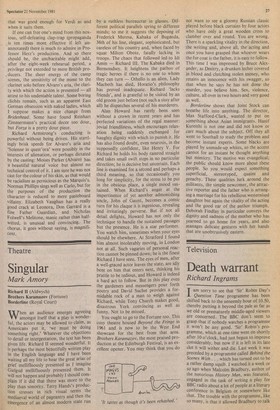Theatre
Singular
Mark Amory
Richard II (Aldwych)
Brothers Karamazov (Fortune) Borderline (Royal Court)
When an audience emerges agreeing amongst itself that a play is wonderful, the actors may be allowed to claim, as Americans put it, 'we must be doing something right.' Whatever the objections to detail or interpretation, the text has been given life. Richard II seemed wonderful. It is perhaps the most beautifully written play in the English language and I have been waiting all my life to hear the great arias of grief mellifluously presented as I imagine Gielgud mellifluously presented them. It will not happen and probably I should comPlain if it did that there was more to the Play than sonority. Terry Hands's production stresses in rich visual terms the mediaeval world of pageantry and then the emergence of an almost modern state run by a ruthless bureaucrat in glasses. Different political parallels spring to different minds; to me it suggests the deposing of Frederick Mutesa, Kabaka of Buganda, 36th of his line, elegant, sophisticated, but careless of his country and, when faced by squat Milton Obote, fatally lacking in troops. The chaos that followed led to Idi Amin — Richard III. The Kabaka died in Bermondsey. It heightens the pathos of tragic heroes if there is no one to whom they can turn — Othello is an alien, Lady Macbeth has died, Horatio's philosophy has proved inadequate. Richard 'lacks friends', and is grateful to be visited by an old groom just before (not such a sissy after all) he dispatches several of his murderers.
Alan Howard has rarely been seen without a crown in recent years and has perfected variations of the regal manner: jovial friendliness, which encourages relaxation being suddenly exchanged for haughty dignity with which to punish it. He has also found doubt, even neurosis, in the supposedly confident, like Henry V. For Richard he holds his body ramrod straight and takes small swift steps in no particular direction; he is decisive but uncertain. Each line is examined for a second and perhaps a third meaning, so that occasionally you long for simplicity, for the stress to be put in the obvious place, a single mood sustained. When Richard's anger at the impertinence of yet another admonishing uncle, John of Gaunt, becomes a comic turn for his claque it is ingenious, revealing and irritatingly perverse. But if not all detail delights, Howard has not only the technique to handle the sustained passages but the presence. He is a star performer. You watch him, sometimes when your eyes should be elsewhere. At Stratford I found him almost Intolerably moving, in London not at all. Such vagaries of personal reaction cannot be pinned down; he is the finest Richard I have seen. The eyes of men, after a well-graced actor leaves the state, are idly bent on him that enters next, thinking his prattle to be tedious, and Howard is indeed a hard act to follow. But in this play even the gardeners and messengers pour forth Poetry and David Suchet provides a formidable rock of a man to weigh against Richard, while Tony Church makes good, disastrous York convincing as well as funny. Not to be missed.
You ought to go to the Fortune too. This cosy theatre housed Beyond the Fringe in 1961 and is now to be the West End showcase for the best from that area. Brothers Karamazov, the most praised production at the Edinburgh Festival, is an excellent opener. You may think that you do not want to see a gloomy Russian classic played before black curtains by four actors who have only a great wooden cross to clamber over and round. You are wrong. There is a sparkling vitality in the direction, the writing and, above all, the acting and once you have grasped that whoever wears the fur coat is the father, it is easy to follow. This time I was impressed by Bruce Alexander, as Dmitry, a drunken lecher covered in blood and clutching stolen money, who retains an innocence with his swagger, so that when he says he has not done the murder, you believe him. Sex, violence, culture, all over in two hours and very good as well.
Borderline shows that Joint Stock can breathe life into anything. The director, Max Stafford-Clark, wanted to put on something about Asian immigrants. Hanif Kureishi is not one and did not know or care much about the subject. Off they all went to Southall to study the problem and become instant experts. Some blacks are played by unmade-up whites, so the accent cannot for an instant be thought anything but mimicry. The motive was evangelical; the public should know more about these people. So you would expect something superficial, stereotyped, quaint and preachy. These qualities lurk around the militants, the simple newcomer, the attractive reporter and the father who is arranging a marriage for his rebellious westernised daughter but again the vitality of the acting and the good ear of the author triumph. Deborah Findlay in particular conveys the dignity and sadness of the mother who has yearned to go home for years, and also manages delicate gestures with her hands that are unobtrusively eastern.










































 Previous page
Previous page